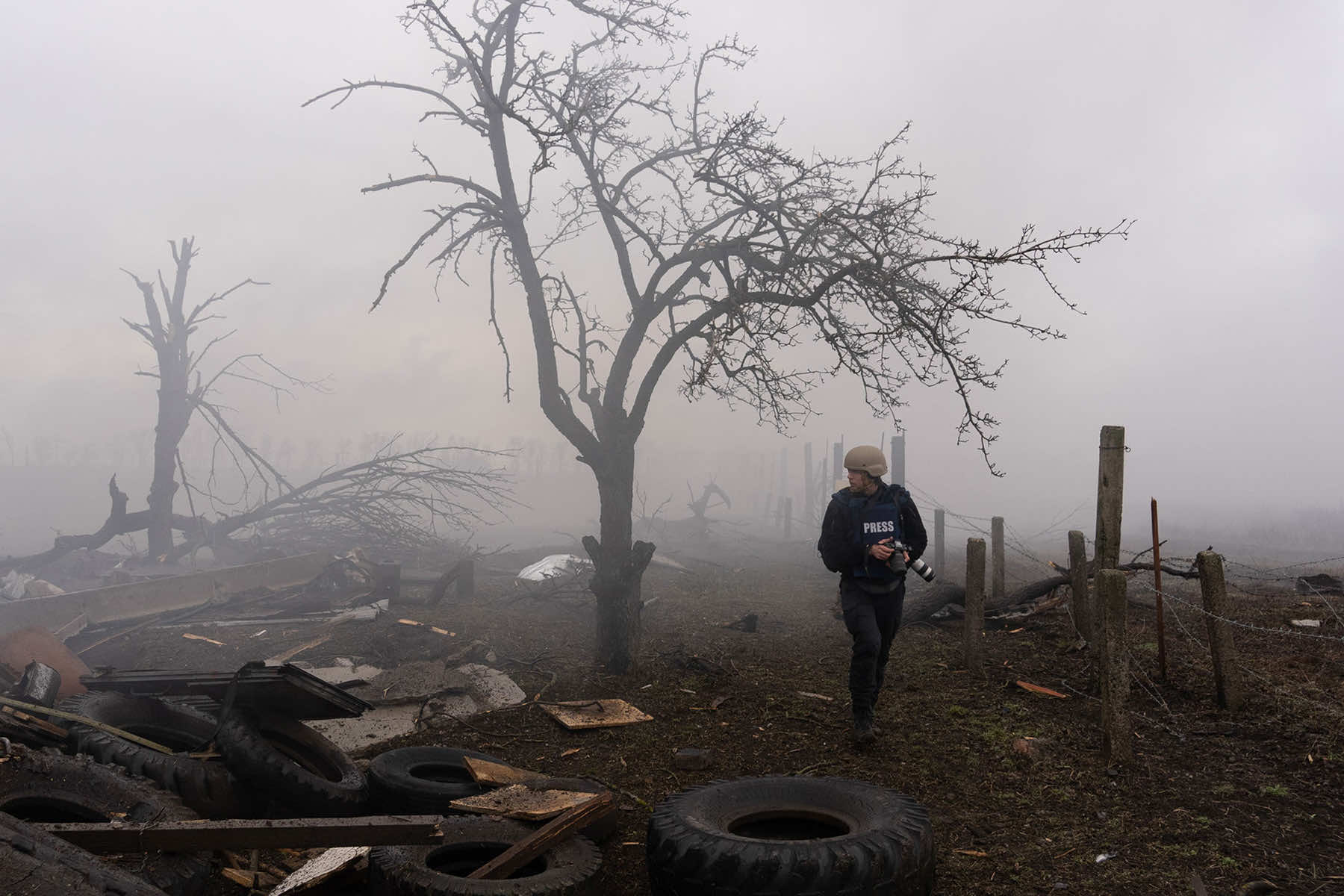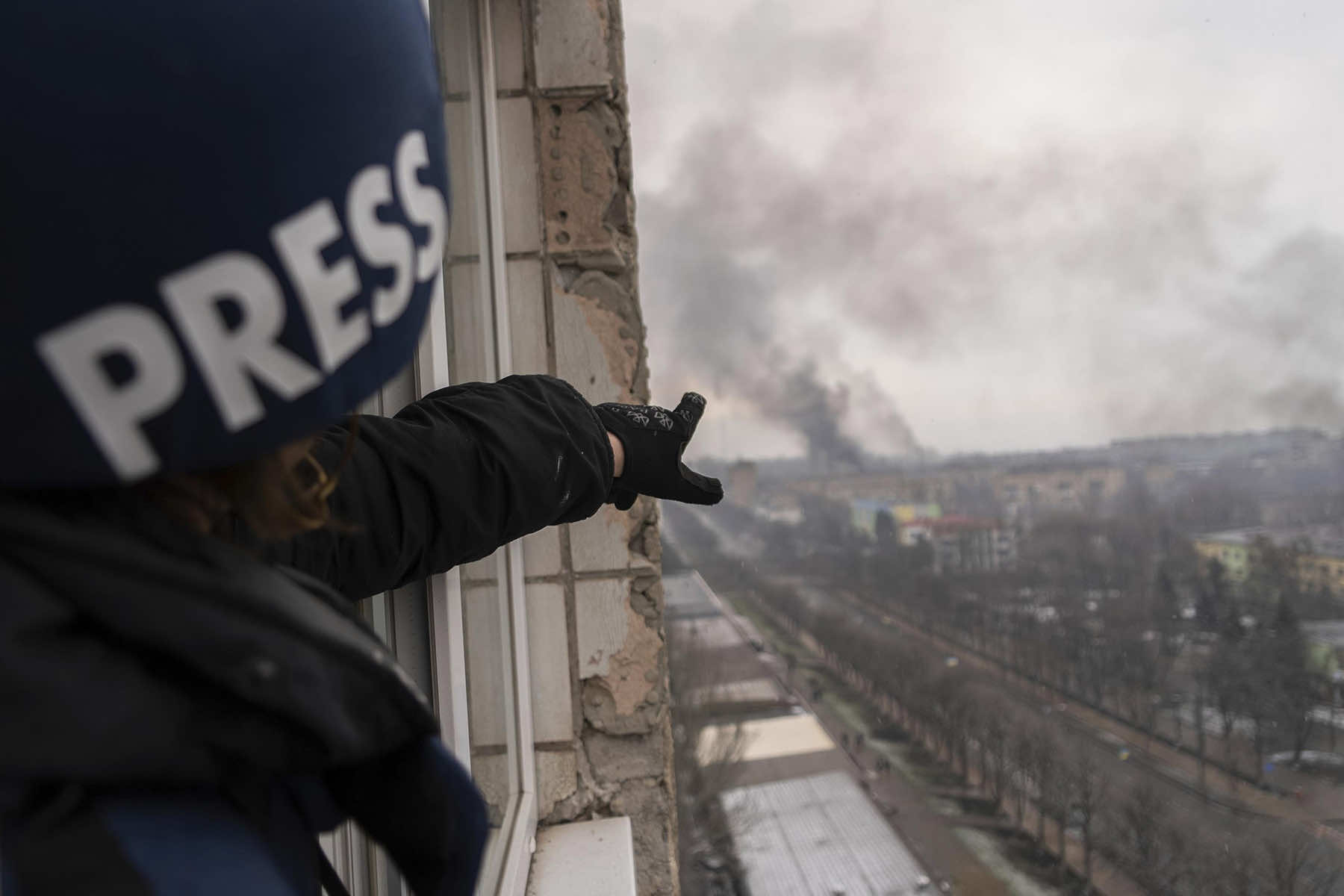
The visceral documentary “20 Days in Mariupol” produced by the Associated Press and Frontline (PBS) was awarded the Sundance Film Festival’s World Cinema Documentary Competition Audience Award in January. It will be showcased locally during the 2023 Milwaukee Film Festival on April 27 at the Avalon Theater.
The film, which made its world premiere at Sundance, offered a first-person view of the early days of Russia’s invasion of the port city of Mariupol, Ukraine. It is told through the perspective of Ukrainian-born director and Associated Press video journalist Mstyslav Chernov.
“I want to thank everyone who believed in us — the AP, Frontline, Sundance, and all the audiences who didn’t turn away from this film,” Chernov said when he accepted the award. “This is not an achievement. This is a privilege for me as a director, for us as a team, and for all Ukrainians. People care and the whole world will watch them fight.”
To shoot the 94-minute documentary, Chernov went with photographer Evgeniy Maloletka and field producer Vasilisa Stepanenko to the port city of Mariupol on February 24, 2022. They then spent 20 days recording life in the city as it was attacked by the Russian army. Together they documented what would become defining images of the war: dying children, mass graves, the bombing of a maternity hospital, and other Russian war crimes.
Chernov and his team had managed to withdraw from Mariupol by March 15, and were feeling guilty about leaving. The day after, a theater with hundreds of people sheltering inside was intentionally bombed by Russian forces, and Chernov knew no one was there to document it.
That was when Chernov decided he wanted to do something bigger. He had filmed some 30 hours of footage over his days in Mariupol. But poor and sometimes no internet connections made it extremely difficult to export anything. He estimated only about 40 minutes of that footage successfully made it out to the world.
“Those shots which went out were very important. They went on the AP and then to thousands of news outlets,” Chernov said. “However, I had much more … I thought I should do something more. I should do something more with that 30 hours of footage to tell a bigger story and more context to show the audience of the scale.”
Produced and edited by Frontline’s Michelle Mizner, “20 Days in Mariupol” drew on Chernov’s daily news dispatches and personal footage of his own country at war. The result is a raw and haunting account of a journalist risking his life to share the truth of the conflict with the world.
“It’s just a lens through which we see the stories of Mariupol’s residents, the death, their suffering the destruction of their homes,” Chernov said. “At the same time, I felt that I can do it. I’m allowed to do it because I’m part of the community. I was born in eastern Ukraine and a photographer who worked with me was born in the city which is right next to Maruipol, which got occupied. So this is our story too.”
As an AP employee, Chernov was extremely aware of maintaining neutrality and being unbiased. There were, he knew, many ways to tell the stories he experienced. But he decided early on to keep it contained to those harrowing first 20 days that he and his colleagues were on the ground, to evoke the claustrophobic feeling of being trapped. He also chose to narrate it himself, and tell the story as a journalist would.
“It’s OK to tell the audiences about your emotions,” he said. “It’s just important to not let those emotions dictate what you show and don’t show … While narrated by me, I still tried to keep it fair.”
Chernov and his team encounter many different reactions to their work on the ground reporting on the full-scale invasion. Some thanked them for doing their jobs. Some called them prostitutes. Some doctors urged them to film graphic scenes of injured and dead children to show the world what had been done.
After Chernov left Mariupol and was finally able to catch up with the news reports around the world, he was stunned by the effect their footage seemed to have had. They followed up with people they had met during their time there, some of whom got out, some who did not.
Some said relatives had found them because of the footage, or that they had been able to get help because of the team’s reports. Doctors and officials said their journalism made it easier to negotiate the green corridor to safety.
“I don’t know how much of that is our footage, how much of that is just what happens,” Chernov said. “But I really would like to believe that we did make a difference, because I guess that’s what journalism is about, to inform people so they make certain decisions.”
Another mission for him was to provide historical evidence for potential war crimes. Chernov is keenly aware that the war is not even history yet. It is a painful reality that is ongoing. After the documentary screened at Sundance, he said that he just wanted to return to Ukraine and go to the frontline.
Called a “harrowingly immediate look at a city under siege” by Variety, “haunting and riveting“ by The Los Angeles Times, and “one of the most important movies of Sundance” by RogerEbert.com, “20 Days in Mariupol” is part of a larger editorial collaboration between Frontline and AP examining Russia’s war in Ukraine.
As U.S. television’s longest-running investigative documentary series, Frontline explores current events through powerful storytelling. The Associated Press is an independent global news organization dedicated to factual reporting. Founded in 1846, AP today remains the most trusted source of fast, accurate, unbiased news.
2023 marks the 15th year of the annual Milwaukee Film Festival. More than 250 films will be shown across 6 theaters and virtually from April 20 to May 4.
“These are the best new films from around the world and from right here in Milwaukee,” said Cara Ogburn, Milwaukee Film artistic director. “There’s something for everyone in this festival, with a lot of opportunity to discover new talent, new voices, new stories, and cozy up with the rest of our city.”
20 Days in Mariupol follows last year’s entry. In January 2022, organizers selected a Ukrainian film that had won at the Sundance Film Festival for the 2022 Milwaukee Film Festival’s lineup. Klondike had just won for Best Director, set in July 2014 at the onset of the Donbas war. A few weeks after the movie’s selection, Ukraine would face an even more brutal full-scale invasion by Russia.
MI Staff, AP Staff, and Lindsey Bahr
Mstyslav Chernov















